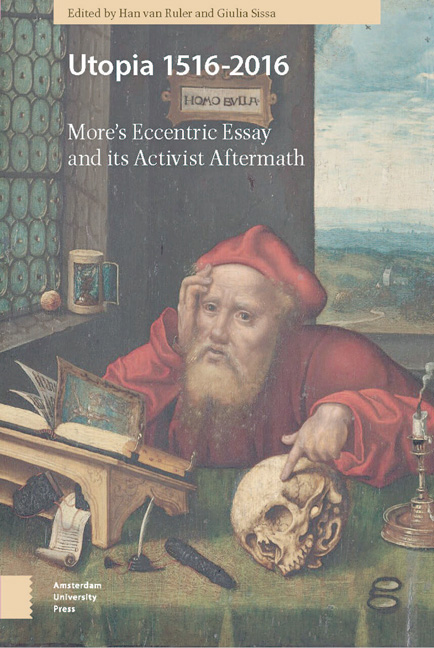Book contents
- Frontmatter
- Contents
- Introduction
- PART 1 THE BOOK
- A Praise of Pain: Thomas More’s Anti-utopianism
- Bodies, morals, and religion: Utopia and the Erasmian idea of Human Progress
- PART 2 ORIGINAL RECEPTION
- Realism Vs Utopianism: The Problem of the Prince in the Early-Modern Netherlands
- From Thomas More to Thomas Smith: Utopian and Anti-Utopian Understandings of Economic Change in Sixteenth-century England
- PART 3 PHILOSOPHICAL CRITICISM
- Reflections on the Utopian Mind
- Utopianism in Today’s Health Care
- PART 4 PHILOSOPHICAL ACCLAIM
- Utopianism and its Discontents: A Conceptual History
- The integrity of Exacerbated Ambiguity: More’s Utopia as an Evaluative Thought Experiment
- Index
Realism Vs Utopianism: The Problem of the Prince in the Early-Modern Netherlands
Published online by Cambridge University Press: 12 December 2020
- Frontmatter
- Contents
- Introduction
- PART 1 THE BOOK
- A Praise of Pain: Thomas More’s Anti-utopianism
- Bodies, morals, and religion: Utopia and the Erasmian idea of Human Progress
- PART 2 ORIGINAL RECEPTION
- Realism Vs Utopianism: The Problem of the Prince in the Early-Modern Netherlands
- From Thomas More to Thomas Smith: Utopian and Anti-Utopian Understandings of Economic Change in Sixteenth-century England
- PART 3 PHILOSOPHICAL CRITICISM
- Reflections on the Utopian Mind
- Utopianism in Today’s Health Care
- PART 4 PHILOSOPHICAL ACCLAIM
- Utopianism and its Discontents: A Conceptual History
- The integrity of Exacerbated Ambiguity: More’s Utopia as an Evaluative Thought Experiment
- Index
Summary
Abstract
1516 saw the publication of three important works. First of all, it is the year of Thomas More's Utopia. But it is also the year in which Erasmus published his major political work The Education of the Christian Prince. The third work even appeared with the same publisher as More's Utopia, viz. Nicolaas Everaerts's Topica or legal commonplaces. All three works are remarkable in their own way. Erasmus represents a tradition that goes back to Petrarch and that saw the well-being of society as totally dependent on the virtuousness of its prince. For Thomas More this was far too risky and therefore he sketched a radical alternative that was based on a reorganisation of society as a whole. However appealing his imaginary island was, it is remarkable that within the domain of political theory it did not attract too much attention. Most authors focused on another work, that was conceived in the very same period, viz. Machiavelli's Prince. The present article will shed light on these developments by focusing on the work of two further early-modern intellectuals active in the Netherlands. Both Justus Lipsius and Leonardus Lessius, whose work bears a strong resemblance to that of Everaerts, looked for the ideal society. And this was not a society after the model of More, but a society modelled after a welldefined form of Machiavellism.
Keywords: political science, realism, Machiavellism, utopianism, Lipsius, Lessius
Introduction
In 1516, Thomas More's ingenious description of the island of Utopia and its distinct yet perfect form of communal life appeared in print. It was also the year in which the famous Dutch humanist Desiderius Erasmus (1466-1536) published his Institutio principis Christiani (The Education of the Christian Prince), and the lesser known Dutch jurist Nicolaas Everaerts (c. 1462-1532) his Topica seu loci legales (Topica or legal commonplaces). On the other side of the Alps Niccolò Machiavelli (1469-1527) was still working on his notorious Il Principe for Lorenzo II de’ Medici. Although there is no direct connection between any of these works, they are all landmarks in earlymodern intellectual life generally, and in the development of political and juridical thought in particular.
- Type
- Chapter
- Information
- Utopia 1516-2016More's Eccentric Essay and its Activist Aftermath, pp. 109 - 142Publisher: Amsterdam University PressPrint publication year: 2017



